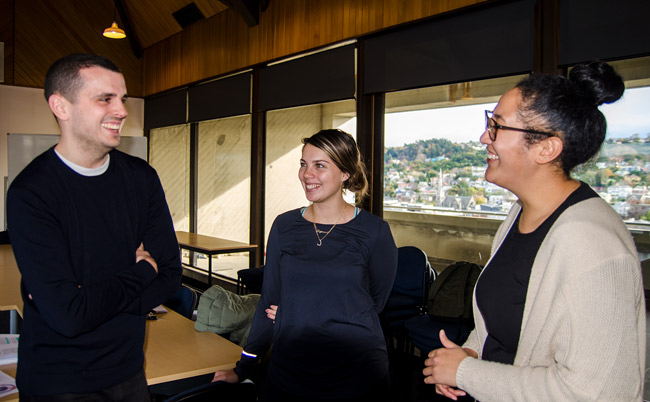Tuesday 21 May 2019 10:47pm

PhD student Oliver Skinner (left), former Te Ropu Whai Putake president Jazmine Cassidy (centre) and Nera Tautau at a meeting of indigenous postgraduate law students at Otago last week.
A golden dawn is approaching for Māori postgraduate law students at the University of Otago.
Eight indigenous postgraduate law students met in Dunedin last week to build relationships and learn more about indigenous legal research methods and literature.
For students like Wellington-based Oliver Skinner (Tainui), who started his PhD part-time last year, having the opportunity to soak in, and learn from, other postgraduate students has been significant.
“It has just been so beneficial for me to be able to talk about the ideas that I am still really working through,” Oliver says. “It has been great to do it amongst a group of people bringing different skills and backgrounds, and how they approached things and how they’re thinking.”
The cohort is incredibly significant. In its 150 years, the University has graduated just four Māori with a Master of Laws (LLM).
"It’s been remarkable reflecting on this momentum and to have eight students now connected in doing postgraduate work."
Fellow Wellington-based postgraduate part-time student Renay Taylor (Ngāpuhi), the freedom to soak in Maoritanga has been liberating.
“I think for all of us to be able to talk about our legal Indigenous research and not have to explain aspects of it around the ‘whakaaro’ and what we all know rather than trying to explain things in a corporate world.
“Not being in a sceptical audience and the knowledge that has come out in the last few days has really fed me.”
The group spent last week learning about indigenous legal research, theory and methodologies and speaking with Te Roopu Whai Putake, the University’s undergraduate Māori law student association and the Pasific Island Law Students’ Association.
Professor Jacinta Ruru of the Faculty of Law, herself an LLM graduate from Otago, says the number of tauira Māori moving into postgraduate study in law had been limited, but is starting to change.
“I have just been so excited to have this momentum here this week,” Professor Ruru says. “It’s been remarkable reflecting on this momentum and to have eight students now connected in doing postgraduate work.”
Among the eight indigenous students working on postgraduate law is Mele Tupou, a PhD student of Tongan descent studying the effects of the 2010 constitutional reform in Tonga.
Mele says connecting with her indigenous fanau has been the highlight of her final push towards completing her qualification this year.
“Getting to connect with others, getting to learn and knowing there are others out there like me. That has been the biggest thing for me this week,” she says. “Being comfortable to talk about what you love and are passionate about in your research.”
Tupou likened the group and the exchange of knowledge throughout the week to the process of weaving a mat. The strains of knowledge from the community and those close to her, she says, create a perfect model of how to more meaningfully incorporate the wider public into her research.
"That’s something I’ll carry with me for a long time. Not just because we can cross-chat, but because we are connected as a roopu now."
Among the other students in attendance throughout the week was Jason Arnold (Pākehā). A Master of Arts (MA) candidate based in Christchurch, Jason has spent 10 years working for Te Rūnanga o Ngai Tahu and is now based with the Department of Conservation. His thesis aims to explore the indigenisation of the land classification system.
“Indigineity is pretty much a fundamental basis of what I do and so this is super important to me,” he says. “It’s totally different from the Pākeha world. It’s hard to describe in a short sentence but it’s totally different and something I’ve really loved.
“Getting back into the mix of this and a whole other dimension of this has been great.”
While at different stages of their qualifications, the group knows it is in the midst of a boom for Māori and Indigenous postgraduate law.
Spurred on by stronger connections, the members of the cohort have returned to their respective cities.
“We will always know each other now, more so than if we sat in a study group in a library,” Renay said. “That’s something I’ll carry with me for a long time. Not just because we can cross-chat, but because we are connected as a roopu now.”
